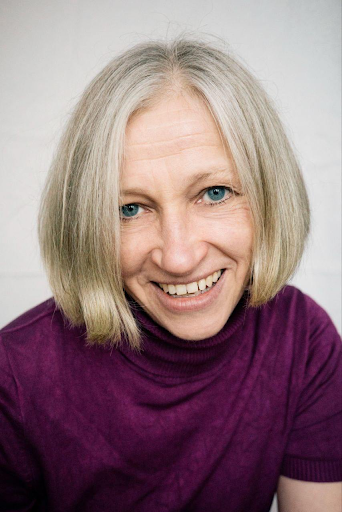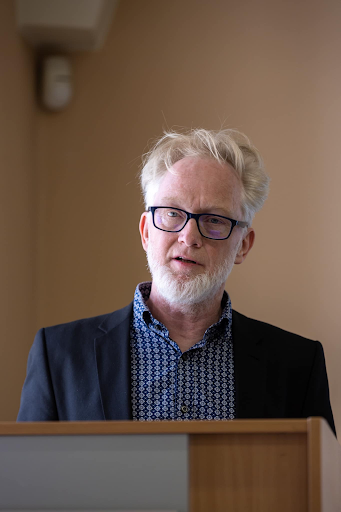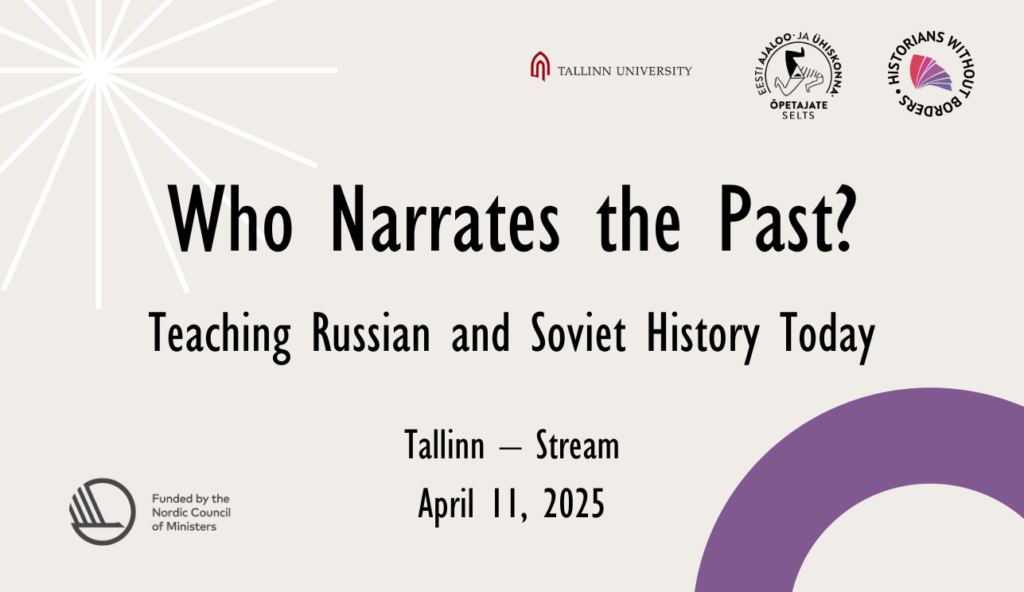Date and time:
April 11, 2025, at 14:00-17:30 (EEST)
Venue:
Panel discussion: Auditorium M225, Uus-Sadama 5, Tallinn University
Coffee break: Atrium, Uus-Sadama 5, Tallinn University
Movie screening: SuperNova Cinema (N-406), Narva mnt 27, 4th floor, Tallinn University
The event will also be streamed online.
The teaching of Russian and Soviet history is undergoing profound shifts in response to current political and social realities. This event, organised by Historians without Borders in Finland in cooperation with the Estonian History and Civics Teachers’ Association and Tallinn University, will examine the challenges of teaching Russia’s and the Soviet Union’s past in the current moment. As ideological control over history tightens in Russia, educators and historians face growing restrictions, censorship, and the urgent need for independent perspectives. What obstacles do educators face both inside and outside Russia? How do different national contexts shape the ways Russian and Soviet history are taught? The event will explore evolving methodologies, alternative formats for historical education, and the broader implications of teaching these histories today. It will conclude with a screening of War on Education, a documentary produced by EuroClio – European Association of History Educators, exposing Russia’s use of education as a tool of propaganda and the role of education in shaping the future of Ukraine.
Pre-registration for the event is required:
Program:
Please note that the panel discussion will take place at Auditorium M225 (Uus-Sadama 5, Tallinn University) and the movie screening will take place at the SuperNova Cinema, (Narva mnt 27, 4th floor, Tallinn University). The coffee break will take place at the Atrium (Uus-Sadama 5, Tallinn University).
14:00–14:15 Opening Remarks
14:15–16:00 Panel Discussion, Audience Q&A
- Jan Levchenko, PhD, Smolny Beyond Borders, Faculty of Liberal Arts and Sciences
- Natasha Konradova, Memorial (Nobel Peace Prize Laureate, 2022), coordinator of the educational program Zukunft Memorial “A Person in History. (Post-)Soviet Experience.”
- Hanna-Liis Kaarlõp, Junior Lecturer in history didactics and PhD student at Tallinn University
Moderator: Karsten Brüggemann, Professor of Political and Social History at the School of Humanities of Tallinn University
Mare Oja has unfortunately had to cancel her participation in the panel.
16:00–16:30 Coffee Break
16:30–17:30 Screening of "War on Education"
War on Education (2024), 56 min
Director: Stefano Di Pietro
Spoken languages: English, Ukrainian, Russian. The movie will be subtitled in English.
The event is part of History in Exile: Dialogue on Russian Memory and History Politics in the Nordic and Baltic Countries, a project launched by Historians without Borders in Finland and funded by the Nordic Council of Ministers.
Recording:
Speakers:

Jan Levchenko, PhD in semiotics (University of Tartu), MA in art history (European a university at St.Petersburg). The former professor of cultural studies at the Higher School of Economics, Moscow (2009-2021). He’s also a columnist for Radio Liberty, Novaya Gazeta, Rus.Postimees, etc. Currently he teaches visual studies at FLAS (Budva) and Smolny Beyond Borders (Berlin).

Natasha Konradova is a journalist, researcher, and author of academic and artistic projects. She holds a PhD in cultural studies (2001) and has worked as a journalist and editor for various media, including Polit.ru, Vokrug Sveta, and Radio Free Europe/Radio Liberty. Based in Berlin since 2015, she is the author of “Archeology of the Russian Internet: Telepathy, Teleconferences, and other Cold War Techno-utopias” (in Russian, 2022) and co-author of several popular science projects. She has also contributed to various books, exhibitions, and multimedia projects, mainly focused on research-based art and media archaeology. Since 2023, she has been leading the Memorial’s school history competition “A Person in History. (Post-)Soviet Experience.”

Hanna-Liis Kaarlõp is a junior lecturer in history didactics and a PhD student at Tallinn University. Her research focuses on teaching controversial and sensitive historical topics, epistemic beliefs about history, and how these shape meaningful learning experiences. Her doctoral dissertation examines how teachers and students engage with historical controversies in multicultural classrooms, emphasizing dialogic pedagogy and critical, reflective approaches to history education. She has worked as a history and civics teacher in a Russian-language school and as an education coordinator at the Estonian National Commission for UNESCO. She is also a co-author of the IEA International Civic and Citizenship Education Study (ICCS 2022), which assesses young people’s civic knowledge and engagement.

Karsten Brüggemann is the Professor of Political and Social History at the School of Humanities of Tallinn University. He received his PhD in history from the University of Hamburg in 1999 with a study of the Russian Civil War in the Baltic region. In 2013, he defended his habilitation at the University of Gießen with a study on the perception of the Baltic provinces in Russian imperial culture published in 2018 (Licht und Luft des Imperiums. Legimitations- und Repräsentationsstrategien russischer Herrschaft in den Ostseeprovinzen im 19. und frühen 20. Jahrhundert, Wiesbaden: Harrassowitz). His main research areas include: History of the Baltic states and Russia / Soviet Union, Transnational History, Memory and History, The Historical Dimension of Sport, Tourism and Music.
Additional information:
Historians without Borders in Finland
hix@hwb.fi
www.historianswithoutborders.fi

